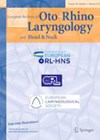
Journal Reviews archive for January 2024
Otolith malfunction can be a cause of orthostatic dizziness
This prospective study evaluated otolith function with vestibular evoked myogenic potentials (VEMPs) and subjective visual vertical / horizontal (SVH) tests in 50 adults with normal hearing between the ages of 18 and 50 years. The authors hypothesised that there are...
Metrics to evaluate post-ACDF dysphagia
The authors performed a literature review to evaluate the current classification metrics for quantifying dysphagia after anterior spine surgery and, specifically, cervical discectomy and fusion (ACDF). They selected 19 articles after reviewing literature from 2005 to 2021. The result of...
Be mindful of exposure
This is a topic which has been highlighted before in the Hearing Research series, as the evidence base regarding the specific impact of acoustic trauma on the auditory system has been expanding regularly in the last few years. This particular...
Third-party disability in cochlear implant users
Hearing loss causes changes for those experiencing it and the people who share in their everyday lives, often referred to as third party disability or caregiver burden. This study emphasises the notion that this phenomenon can be considered a disability,...
A song for my future self
People with aphasia experience a loss of friendships and social networks and, with this, a loss of identity. Interventions targeting participation, social and emotional wellbeing for people with aphasia have received more attention in the research literature. Storytelling is a...
Occurrence of cancer in asymmetrical tonsillar enlargement in adults
With significant increase in head and neck cancer in the last decade, attributed to HPV, fast-track referrals from primary care have markedly increased, adding further to the burden on the NHS. Whether or not unilateral tonsillar enlargement alone, without red...
Patient-related factors that require revision surgery for otosclerosis
Stapes surgery for otosclerosis has a high success and low complication rate but, over a period of time, good results can deteriorate, requiring revision surgery. In this study, the authors have focused on patients’ demographic data as predictive factors for...
Infection and other factors influencing post-tonsillectomy haemorrhage
In this detailed narrative review article, the authors have addressed several factors which could be related to postoperative bleeding after tonsillectomy. As regards to microbiology, the significance of micro-organisms present both on surface and within the tonsils is emphasised and...
Metformin, the magical solution!
Both noise-induced hearing loss (NIHL) and vestibular schwannomas (VSs) pose a challenge in terms of management. Metformin was suggested as a potential therapeutic drug for NIHL when the drug-target interaction data was investigated. Additionally, there are studies which demonstrate reduction...
Surgery plus radiotherapy keeps the helical keloid scar away
Keloid scars lead to significant psychological and cosmetic morbidity. As the pinna is a key component of facial cosmesis, pinna keloid scar formation can be aesthetically displeasing. Their stubbornness and high recurrence rate can be challenging to treat. This department,...
Ego-resiliency and tinnitus
Adults with tinnitus are 2.5 more likely to suffer with depression and anxiety. Ego-resiliency is the ability of a person to adapt to change and cope in difficult situations. This study aimed to determine whether ego-resiliency is related to perceived...
Booklet-based supervised vs. non-supervised vestibular rehabilitation
There are conflicting results in the literature about home-based vestibular rehabilitation training (VRT) as opposed to physiotherapist-led training. A randomised controlled trial was designed to interrogate this further. The primary aim was to assess “the effects of a booklet-based exercise...














